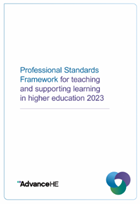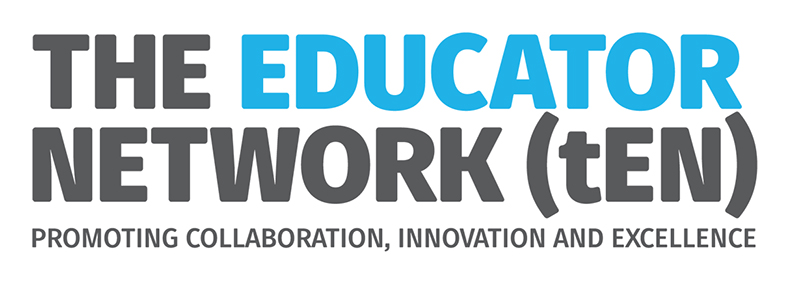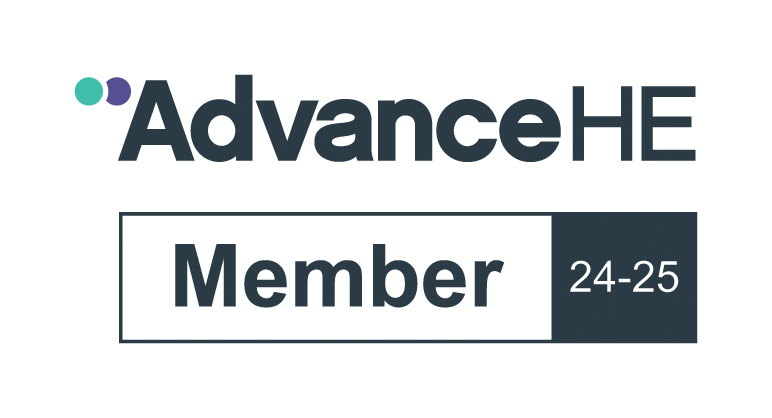
Teaching and research
This resource introduces you to the Advance HE Fellowship scheme and requirements to begin preparing your application. This fellowship scheme is open to all staff who teach and/or support learning within Higher Education.
Overview
 The UK Professional Standards Framework (UKPSF) is a globally recognised inclusive framework for benchmarking success within Higher Education teaching and learning support. It recognises the critical role of the context in which your teaching and/or support of learning takes place. The framework provides a general description of the main dimensions of the roles of teaching and supporting learning within the Higher Education (HE) environment.
The UK Professional Standards Framework (UKPSF) is a globally recognised inclusive framework for benchmarking success within Higher Education teaching and learning support. It recognises the critical role of the context in which your teaching and/or support of learning takes place. The framework provides a general description of the main dimensions of the roles of teaching and supporting learning within the Higher Education (HE) environment.
Advance HE, formerly known as UK Higher Education Academy, offers, under the UKPSF four categories of Fellowship:
Descriptor 1 (D1) – Associate Fellowship (AF)
Descriptor 2 (D2) – Fellowship (F)
Descriptor 3 (D3) – Senior Fellowship (SF)
Descriptor 4 (D4) – Principal Fellowship (PF)
Fellowship demonstrates a personal and institutional commitment to professionalism in learning and teaching in higher education. The categories reflect the wide range of professional practice carried out by individuals who teach and/or support learning in higher education.
Staff from the University of Newcastle can apply directly to Advance HE for Fellowship at any time, however associated fees do apply. Please refer to the table of fees for "Direct application to the Advance HE (individual from a member institution)". Application fees for UON staff may be funded by the Educator Network (tEN). This is contingent upon funding availability and meeting UON's internal application review process. Please contact tEN for more information.
Fellowships are awarded on the basis of successful and effective demonstration of one of the four UKPSF Descriptors (D1, D2, D3, D4).
The Advance HE Category Tool can assist you in determining which category of Fellowship most closely reflects your current practice. You may fall between multiple categories, in which case it is recommended that you apply for the lower category level in order to meet the relevant criteria. As an example, if the results indicate you fall between two categories, e.g. Fellow (D2) and Senior Fellow (D3), we would recommend you complete an application under the Fellow category. 
The Educator Network supports the Advance HE Fellowship process by providing internal draft application reviews, providing feedback prior to submission and aligning applicants with existing Fellows from across our institution.
Requirements for preparing an application under each of the four categories are listed below, and includes relevant descriptors to be evidenced within your application and the specific components to be completed within the AHE template provided.
Each application is to be accompanied by supporting statement(s). These statements should be prepared by people who are very familiar with your work. They need to confirm that your application is true and correct and you meet the criteria for each of the relevant dimensions in the UKPSF. At least one statement should come from an existing Fellow (if possible).
Application Requirements
Evidence of:
Effective Practice for specific dimensions
D1.1 - use of appropriate Professional Values (V1 & V3 at least)
D1.2 - application of Core Knowledges (K1, K2, K3 at least)
D1.3 - effective and inclusive practice in at least 2 Areas of Activity.
Components:
- Context Statement - (300 words max)
- Reflective Account of Practice using Associate Fellow template provided
- (1400 words max - structured into 2 Areas of Activity (approx 700 words each) - SOTL References - (200 words max)
- Supporting Statement - (x1 signed pdf - using template provided)
Evidence of:
Effective and Inclusive practice for all dimensions
D2.1 - use of all 5 Professional Values
D2.2 - application of all 5 Core Knowledges
D2.3 - effective and inclusive practice in all 5 Areas of Activity.
Components:
- Context Statement - (300 words max)
- Reflective Account of Practice using Fellow template provided
- (3000 words max - structured into the 5 Areas of Activity (approx 600 words each) - SOTL References - (500 words max)
- Supporting Statements - (x2 signed pdf - using template provided)
Evidence of:
Effective and Inclusive practice as it relates to your influence on the learning and teaching practice of others
D3.1 - sustained record of leading or influencing the practice of those who teach and/or support high quality learning Values
D3.2 - practice that is effective, inclusive and integrates all Dimensions
D3.3 - practice that extends significantly beyond direct teaching and/or direct support of learning
Components:
- Context Statement - (300 words max)
- Reflective Account of Practice using Senior Fellow template provided
- (6000 words max - (structured into a RAP and 2 x case studies - approx 2000 words each) - SOTL References - (500 words max)
- Supporting Statements - (x2 signed pdfs - using template provided)
Evidence of:
Practice involves a sustained record of effectiveness in strategic leadership of high-quality learning. Impact is extensive.
D4.1 - sustained and effective strategic leadership of higher education practice, with extensive impact on high-quality learning: within or beyond an institution, or across a discipline or profession
D4.2 - development and implementation of effective and inclusive: strategies, or policies, or procedures, or initiatives, to enhance practice and outcomes for learners
D4.3 - active commitment to, and integration of, all Dimensions in the strategic leadership of academic professional practices
Components:
- Context and Leadership Statement - (300 words max)
- Record of Strategic Educational Impact - (250 words max)
- Reflective Account of Practice using Principal Fellow template provided
- (7000 words max - (x 3 or 4 Case Studies) - SOTL References - (500 words max)
- Supporting Statements - (x3 signed pdfs - using template provided)
Getting Started
Step 1 - Advance HE Category Tool
The Category tool can assist you in determining which category of Fellowship most closely reflects your current practice. We suggest you take 5 minutes to run through this tool. If you fall between two categories, e.g. Fellow (D2) & Senior Fellow (D3), we would suggest you complete an application under the lower category. The ED team are happy to provide further guidance if needed.
Step 2 - Express your Interest in applying for Fellowship
If you are a current staff member of UON, please complete an expression of interest (EOI) to indicate your intention to apply for Fellowship. The Education Development team, on behalf of tEN, will send you resources to assist with your application.
Step 3 - Read the Framework and guidance documents
You will be provided with the Advance HE Application pack that most appropriately evidences your current practice (or you can download them directly from Advance HE - see category descriptors above). This Application pack will contain 5 x guidance documents and templates. It is essential that you read through these as they provide important information and tips for preparing a successful application.
Application Guidance:
- Application Guidance
- Guidance to the Dimensions
- Word template for structuring your application
Supporting Statement Guidance:
- Guidance for Referees
- Word template for supporting statements
The Advance HE Fellowship Podcast
The Advance HE Fellowship Podcast provides further information, guidance and tips on applying for Fellowship. We encourage you to listen to Episode 3 – Using reflection to evidence effective and inclusive practice as it will help you to understand the type of evidence required for your application.
- Episode 1 – Fellowship to enhance teaching and learning
- Episode 2 – Introduction to Senior Fellowship - Descriptor 3
- Episode 3 – Using reflection to evidence effective and inclusive practice
- Episode 4 – Principal Fellowship - Descriptor 4
- Episode 5 - Exploring Fellowship - Descriptor 2
- New sessions to be added each month
Step 4 - Outline your actions/evidence of teaching and/or support of learning
Think about your practice and what actions you have taken that would meet/evidence each of the 15 Dimension. You might like to start with a dot point listing of your actions. Alternatively, record yourself talking about your own practice.
The PSF Dimension Cards can also be very useful here, as they provide guiding questions for consideration when thinking about your own practice and how it meets each Dimension.
Note your application must focus on current practice. That is, actions you have taken within the last 3-5 years (Principal Fellows within the last 3-7 years). You can draw from practice across institutions, so long as it would still be considered current and it relates to Higher Education.
Step 5 - Write your Context Statement (300 words max)
Your Context Statement is the first part of your Account of Professional Practice and you should briefly introduce yourself and outline your role(s) and responsibilities in teaching and/or supporting learning in higher education. This statement helps the UK reviewers to understand the nature of your work and the context in which you practice, before they look at the evidence you provide in the rest of your reflective account of practice (RAP).
The Context Statement is not assessed; therefore, you do not need to include any evidence in this section. It should be used to introduce yourself to the UK reviewers. Focus on your background, University subjects taught, and your qualifications. Include information on where you are working (The University of Newcastle, Australia), who your students are, and how many students are in your classes. Include relevant student demographics to help identify the situation in which you teach. These could be UON specific or specific to your subject, discipline, College – whatever shows your context best.
Step 6 - Reflective Account of Practice (RAP)
Now that you have a framework of actions, using the application template provided, start weaving these actions into a reflective narrative. Consider starting your RAP with a short introduction around your personal teaching philosophy, covering your motivations or driving beliefs as an educator. Ensure you include your own personal reflections throughout your application. For Associate Fellow and Fellow application templates are divided into the specific Areas of Activity, with word counts to be divided roughly equally across these areas of activity. For Senior Fellow and Principal Fellow your word counts will divide roughly equally across the RAP and Case Studies.
Ask yourself:
- What did you do? – what actions did you take?
(or for Senior Fellow - What did you do to influence the practice of others?) - Why did you make the choices you made?
- How did your actions make you feel, as an educator?
- How did any obstacles, successes, or sticky moments influence your teaching practice?
- Evaluate – how do you know your actions were effective?
- What were the outcomes of your actions, next steps, or how did you adapt?
Ensure you are centering yourself in your writing, continuously returning to your actions, outcomes, and your reactions.
Note that the Advance HE portal (used for submission) is text only, so no tables or images can be included. Portal fields are locked to specific wordcounts as outlined in the applicant guidance information. Your application should be in first person and personal to you. Discuss your recent experiences and observations.
Your application must show depth and breadth of experience and expertise. As such, avoid using superficial statements and ensure you are providing detailed examples of your actions. Student feedback, and/or peer feedback etc can also be incorporated into your application where is supports the claims you are making. It is also essential in your narrative to back up your actions by including references of specific scholarship of teaching and learning (SOTL) throughout.
We encourage you to weave reference to the dimensions of the framework throughout your narrative. For example: place (V1, K3) etc at the end of sentences where your specific actions evidence those dimensions. This assists the reviewer to see where you are meeting each of the dimensions of the framework.
Step 7 - Review of your draft
As a UON staff member, once you have a full draft prepared, email a copy to ED-LDTI@newcastle.edu.au. LDTI’s Education Development team will arrange for your draft to be reviewed internally. This review will provide you with constructive feedback and suggestions for improving your application before it proceeds to submission. Occasionally an application may need more than one review.
Step 8 - Supporting Statement(s)
Once your draft has been reviewed internally and is close to being finalised, send 3 files (your draft, the guidance for referee document and supporting statement template) to the person/people completing the supporting statement/s for you. The referee(s) you choose must be very familiar with your work as they are attesting that everything in your application is true and correct and confirming that they believe your practice meets the UKPSF Dimensions. If providing two supporting statements, one may be from outside UON, if they are attesting to current practice prior to joining UON. The completed and signed statements will be uploaded as PDF files into the AHE portal.
Step 9 - Submission
Applications from the University of Newcastle (Australia) are submitted as “Direct applications from a Member Institution”, via the Advance HE portal. You will need to create an account with Advance HE, using your UON staff email address. If you are paying the cost of your own application, you can submit at any time. However, if the Educator Network /UON is funding your application, please do not start your Fellowship application in the portal until after you have been provided with a submission voucher code. You will need to validate this voucher code when creating your application.
For submission, you will go to: https://www.advance-he.ac.uk/login. If you do not already have an Advance HE login, please create one, using your University of Newcastle email address. Once you have received your voucher code, follow the links to Fellowship, and creating a direct application. Once created and submitted, Advance HE may take up to 12 weeks to provide you with the outcome. Occasionally (and once only) Advance HE may ask you to address additional/specific points in your application and allow you to resubmit..
 Additional Resources
Additional Resources
Professional Standards Framework (PSF 2023) Resources
- The Professional Standards Framework (PSF)
- Fellowship Code of Practice
- Fellowship Frequently Asked Questions
- UKPSF Dimensions Cards
Education Development - Upcoming Writing Days / Writing Circles / Q&A Drop in
On behalf of the Educator Network, LDTI’s Education Development (ED) team run a number of workshops to assist staff with application preparation. You are welcome to attend an upcoming Writing Day where you can concentrate on writing your application and gain immediate feedback. ED also run weekly writing circles/Q&A sessions, where you can join a 1hr weekly zoom session. You will be able spend the time writing your application and/or asking questions as you go.
View session dates and register
ACHIEVE SEEK Session - June 2024
"Unpacking the Value of Advance HE Fellowship: Is it worth it?"
This session asks four UON Fellows (each from different categories) to outline the benefits of gaining their Fellowship.
The session also provides you with tips for preparing your own application.
View Session Recording - Passcode: fOX9tyZ$
Contact Us
For further information on applying for Advance HE Fellowship, please contact: ED-LDTI@newcastle.edu.au
The University of Newcastle acknowledges the traditional custodians of the lands within our footprint areas: Awabakal, Darkinjung, Biripai, Worimi, Wonnarua, and Eora Nations. We also pay respect to the wisdom of our Elders past and present.
